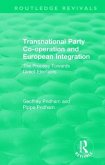European Political Co-operation (EPC) is the process by which Member States of the European Community co-ordinate their foreign policies. This book sets out to describe the development of EPC and to trace the influences which have made it what it is today. The arguments about transfer of sovereignty in foreign policy-making, the influence of the United States, the leading role played by France, and the effect on policy of finding organizational solutions in reaction to crises are all examined through a historical account of events over more than thirty years. EPC is the basis from which the European foreign policy of the future will be developed. This is increasingly significant both for the institutional development of the Community and for its impact on world events, yet the procedures and political pressures which go towards shaping EPC are little known and frequently misunderstood. This book will improve understanding of a new form of diplomatic process, of great interest for the future, but which has barely begun.








